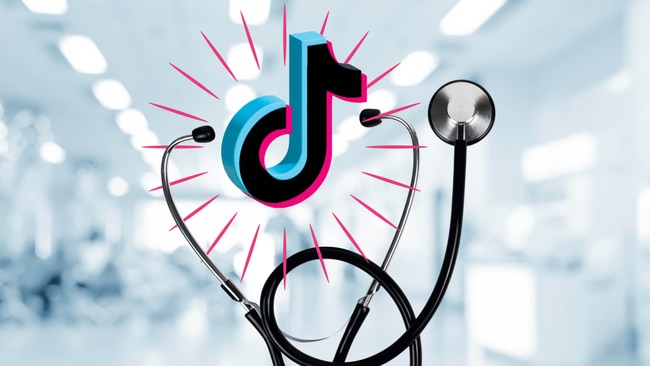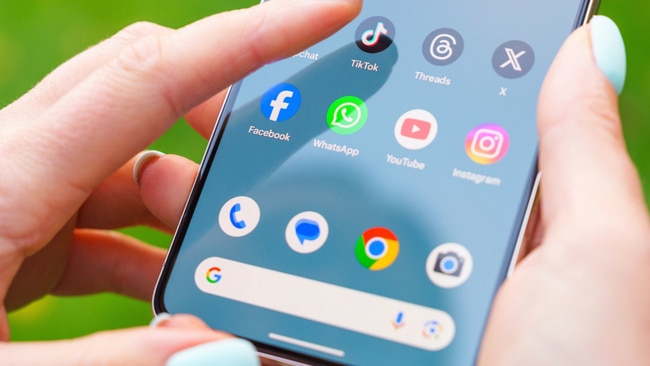'My doctor is on TikTok – should I trust them?'
Is TikTok a friend or foe?

Lifestyle
Don't miss out on the headlines from Lifestyle. Followed categories will be added to My News.
Social media medics are on the rise, with more people turning to their feed for health info. But is your TikDoc the real deal or a dupe?
Those with a nightly doom-scrolling habit have likely been confronted at some point with one of the millions of videos on social media proffering medical advice to the masses. But have you ever wondered if the lab coat wearer on the screen is actually a qualified doctor, or a self-proclaimed expert spreading unverified information?
‘TikTok docs’ are inviting us into their virtual offices in droves. Currently, the hashtag ‘doctor’ boasts 3.1 million posts on TikTok and a whopping 17 million on Instagram. But with misinformation spreading faster than the latest Covid variant, consumers are on their own to decipher who is on these platforms to help treat their virus, and who is just there in the hope of going viral themselves.
Paediatrician Dr Daniel Golshevsky (aka Dr Golly) says he was faced with a dilemma when asked what motivated him to begin building a now 145K-strong following on Instagram. “You can’t replicate yourself,” he says about being unable to reach a wider audience from his rooms at Melbourne’s Cabrini Hospital. Struggling to get information to parents through fact sheets, Dr Golly wanted to take a different approach to combating widespread ‘fake news’.
“If the people spreading misinformation are playing in the realm of social media, that’s where we need to be.” (FYI, you can check if a practitioner is registered by visiting ahpra.gov.au.)
These self-designated ‘experts’ who seem to be infecting our socials aren’t mucking around. A 2021 systematic review from the University of Cadiz, Spain found rates of medical misinformation as high as 40 per cent for posts online about diseases and 43 per cent in posts about vaccines. And yet, people still trust what they see on their feed. A 2023 study of 1000 Australian parents reported 82 per cent using social media when seeking health info for their child.
“Parents don’t read journal articles,” points out Margie Danchin, professor of paediatrics and director of clinician-scientist pathways at Melbourne Medical School, adding evidence-based posts by medical professionals can be “an inoculation against misinformation”.

And it’s not just parents. Women are being left with little choice but to page Doctor TikTok for a work-up, with two-thirds experiencing gender-based discrimination in a healthcare setting according to the Australian Government’s End Gender Bias Survey.
Last year, Sarah Nimarota began experiencing a host of unusual symptoms, including vertigo, anxiety, and unexplained rage. “I felt like I was losing my mind,” she says, after having to insist on a blood test from her doctor. Frustrated by the lack of support from medical professionals, she found Dr Mary Claire’s Instagram page, full of information about perimenopause. “Now I have the knowledge and my power back,” she says, “and my health has improved dramatically.”
“What worries me,” says Professor Danchin, “is that some of these younger doctors who are online sharing medical information are also in it for their own following and the opportunities that can come from that in the media.” It’s a concern governing bodies seem to share, with both the Australian Medical Association and the Medical Board of Australia providing guides encouraging physicians not to “blur the boundaries between private and professional”.
It all begs some uncomfortable (but necessary) questions. Are TikTok docs helping us feel better, or worse? And can you trust your doctor if they’re also moonlighting as an influencer?

According to Professor Danchin, it depends on the creator. “If they’re well informed and sharing evidence-based information, it’s a really accessible form of medical education,” which is why she’s pleased to see that the board is “coming down hard” on bad actors and that universities are addressing the issue with med-school students.
It’s also something Dr Golly takes very seriously. “I’m extremely cautious with the way that I use this platform,” he says.
It would seem, at least when taken as prescribed, advice from qualified TikTok docs could be curative, and there are upsides to doctors taking to socials to educate. Just view wisely before making an appointment with a doctor you’ve seen on social media – lest you walk out wondering if your weird rash is about to become content.
More Coverage
Originally published as 'My doctor is on TikTok – should I trust them?'




